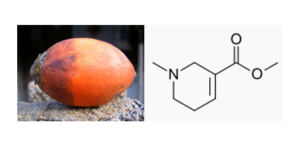Arecoline — the stimulant component of areca nuts — has anticancer properties, researchers at Winship Cancer Institute of Emory University have discovered. The findings were published Thursday, November 17 in Molecular Cell.
Areca nuts are chewed for their stimulant effects in many Asian countries, and evidence links the practice to the development of oral and esophageal cancer. Analogous to nicotine, arecoline was identified as an inhibitor of the enzyme ACAT1, which contributes to the metabolism-distorting Warburg effect in cancer cells.
Observers of health news have complained that coffee, as a widely cited example, is implicated in causing cancer one week and absolved the next. Arecoline is not another instance of the same trend, stresses senior author Jing Chen, PhD, professor of hematology and medical oncology at Emory University School of Medicine and Winship Cancer Institute.
“This is just a proof of principle, showing that ACAT1 is a good anticancer target,” Chen says. “We view arecoline as a lead to other compounds that could be more potent and selective.”
Chen says that arecoline could be compared to arsenic, a form of which is used as a treatment for acute promyelocytic leukemia, but is also linked to several types of cancer. Plus, arecoline’s cancer-promoting effects may be limited if it is not delivered or absorbed orally, he says. When arecoline first arose in a chemical screen, Chen says: “It sounded like a carcinogen to me. But it all depends on the dose and how it is taken into the body.” Read more





